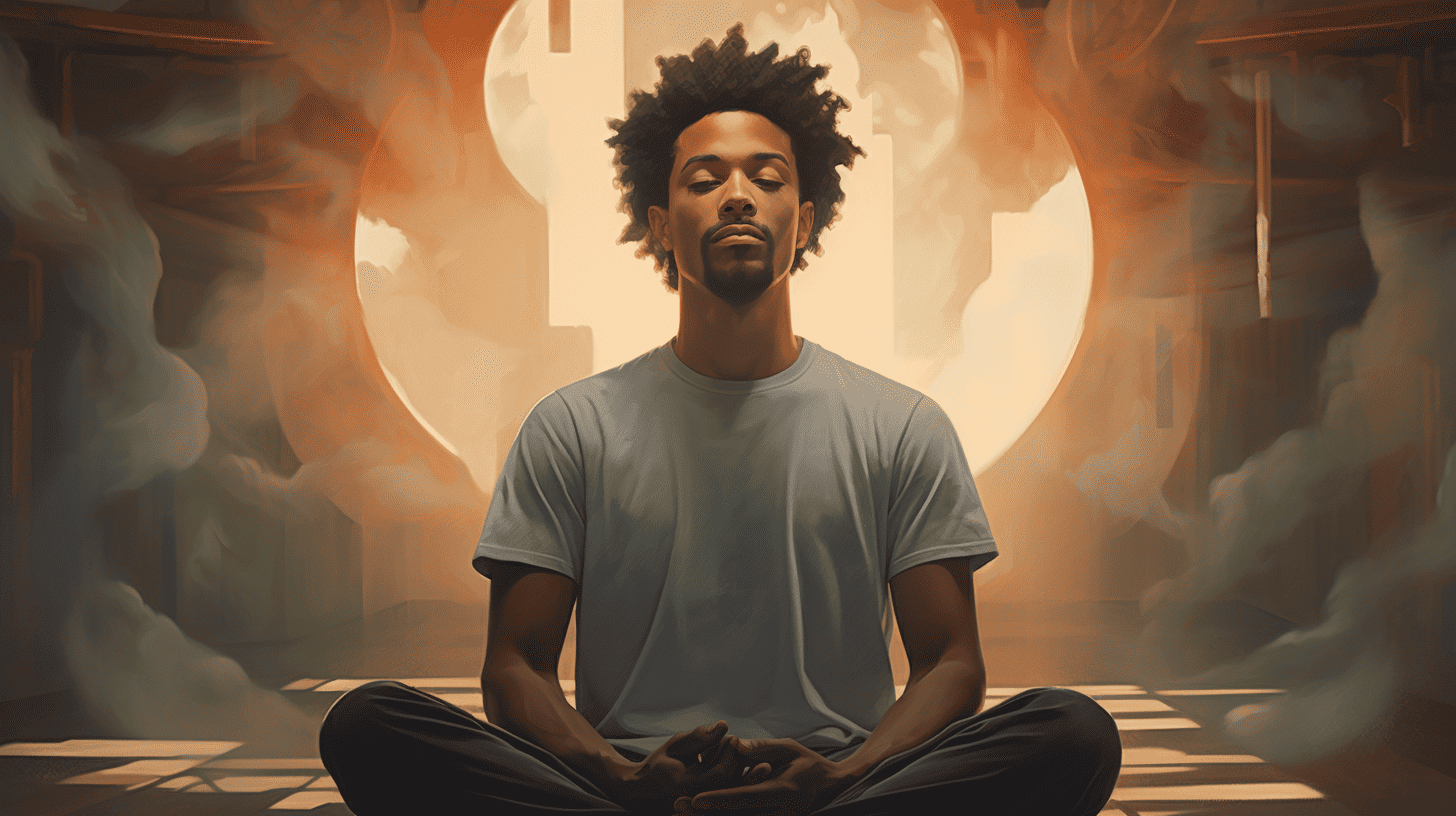Meditation has been practiced for centuries to cultivate peace, compassion, and wisdom. I have been meditating regularly for over ten years and wanted to share some of the most important life lessons I’ve learned from this transformative practice. What meditation teaches you is to work with our minds, understand ourselves on a deeper level, and gain wisdom that we can apply to living a more fulfilling life.
Key Takeaways:
- Meditation teaches us our thoughts are not absolute truth and that we can work with difficult emotions as they arise.
- Our breath anchors us in the present moment and relieves stress. Meditation builds our patience, compassion, and ability to let go.
- We can transform unhelpful mental habits through regular practice. Meditation sharpens our focus, willpower, and resilience.
- Life is fleeting. Meditation motivates us to live meaningfully right now. We discover our inner wisdom when we tune out distractions.
- Even-mindedness, energy conservation, and self-trust develop through meditation. Silence nourishes us deeply.
- The mind wanders constantly in meditation. That’s okay – gently return your focus to the anchor. This act of returning is the real practice.
1. Your Mind Will Wander, and That’s Okay
When you start meditating, one of the first things you learn is that your mind loves to wander. During meditation, you may start thinking about your to-do list, replaying conversations, or getting caught up in daydreams. As soon as you notice your mind has drifted, gently bring your attention back to your anchor, whether it’s your breath, a mantra, or something else. Continually returning to the present moment strengthens your focus and concentration.
Self-Compassion and Patience: Tiny Buddha explains that meditation teaches self-compassion and patience. It helps us recognize our thoughts and understand that it’s natural for our minds to generate them.
I’ve found this skill helps me stay focused when I’m working, listening deeply in conversations, and being more present with my loved ones.
TIP: When you notice your mind has wandered during meditation, don’t judge yourself. See it as an opportunity to build awareness and gently return your focus to the anchor.
2. You Can Work with Difficult Emotions
Meditation teaches us that we don’t have to be afraid of the complex emotions we experience, like anger, grief, and anxiety. By bringing awareness to these feelings during meditation, we realize they are temporary states we can work with.
Whenever challenging emotions have come up in my practice, meditation has taught me to gently acknowledge them without judgment, breathe into them, and let them pass. This helps me stay centered in the face of difficulties.
TIP: Bring a spirit of curiosity and compassion to working with difficult emotions during meditation. Recognize they are passing storms, not permanent realities.
3. Your Thoughts Aren’t Necessarily True

We all have repetitive thought patterns and stories we tell ourselves. In meditation, you learn to observe your thoughts with greater objectivity. You may start to notice when you are catastrophizing, exaggerating negatives, or being too self-critical.
Noticing this tendency during meditation has helped me step back and reframe my thoughts when I’m spiraling into unproductive thinking. I remind myself that just because I think something doesn’t mean it’s an absolute truth.
TIP: Use meditation to become more aware of your thought patterns. Consider whether it’s rooted in reality when you notice an unhelpful narrative.
4. You Have More Patience Than You Think
It takes patience to sit down day after day to meditate. In our fast-paced world, developing the ability to sit still and focus for an extended period goes against the grain. But it’s a skill anyone can build.
Early in my practice, I never thought I could meditate for 30 minutes straight. Now it’s easy. Meditation has shown me that I’m much more patient than I gave myself credit for.
TIP: Start with short meditation sessions if sitting still is difficult. Slowly increase the time as you build patience and concentration.
5. You Are Not Your Thoughts
One of my favorite lessons from meditation is that I’m not my thoughts. In meditation, you create distance from your chattering mind and realize that you are the awareness behind your thoughts, not the thoughts themselves.
When I start taking my thoughts too personally, meditation helps me remember they are just mental events passing through. This helps me not take things so seriously. I have a choice of which thoughts to engage with and which to let go.
TIP: Thoughts come and go. You don’t have to attach your identity to every passing thought.
6. Your Breath Anchors You in the Present
Using the breath as an anchor keeps bringing you back to the present moment during meditation. Deep breathing also promotes relaxation. This has taught me simple, mindful breathing can help calm my mind and body in stressful situations outside of formal meditation.
When I notice I’m feeling overwhelmed, I take 5 deep breaths to return to the here and now. Focusing on my breath never fails to ground me.
TIP: Take a few minutes to pause and focus on your breath throughout your day. It’s a simple way to cultivate mindfulness.
7. You’ll Learn Your Habits and Patterns
In meditation, patterns and habits become more apparent. You may notice specific thoughts or emotions regularly crop up in your practice. For me, recurring feelings of inadequacy often surfaced.
Observing this tendency helped me reflect on how I could be kinder to myself. Meditation can reveal our unconscious patterns to decide which to feed and which to let fall away.
TIP: Make meditation a time for self-study. Observe which emotions and narratives consistently arise and choose how to relate to them.
8. Letting Go Gets Easier
We all have busy, chaotic minds. In meditation, you practice letting go of distractions that distract your attention. At first, it can feel frustrating as your mind wanders constantly. But over time, you strengthen your capacity to let go.
When I notice myself getting hooked on something unproductive in meditation, letting it go feels much more natural. This helps me let go of things more easily in everyday life, too.
TIP: Letting go is a skill that deepens over time. Be patient and keep returning your focus to the present moment during meditation.
9. You’ll Build Compassion for Yourself and Others
One of meditation’s greatest gifts is growing your compassion. Being curious, non-judgmental, and gentle with yourself in meditation naturally extends to how you relate to others.
Sitting with myself through all kinds of emotional states has made me more accepting of my and others’ imperfections and vulnerabilities. Meditation has taught me we’re all doing our best with the tools we have.
TIP: Remember, you’re human. Extend the same compassion you offer yourself in meditation to those around you.
10. Every Moment is New
Have you ever noticed how meditation always feels fresh? Each time you meditate, you drop into the present moment as if for the very first time.
This has taught me that we have an opportunity to start anew in every moment of life. Even if yesterday was complicated, today offers a clean slate — a chance to respond consciously instead of reacting mindlessly.
TIP: Remember that the present moment is always available to you. You can return to it at any time to reset.
11. You Can Transform Your Mind

Regular meditation helps train your mind to return to a calm, clear state. Over time, you transform your mind’s natural baseline. With meditation’s help, I’ve learned to catch myself when I begin down an unproductive mental path and redirect my thinking to a more positive space.
Through meditation, we can change the mind’s tendency to get hooked on negativity. We have the power to improve our mind and transform it.
Brain Changes: Remarkably, studies have found that mindfulness meditation can physically alter parts of the brain, impacting cognitive faculties like learning, memory processes, emotion regulation, and perspective-taking, as reported by Psychology Today.
TIP: Keep meditating! With consistency, you reshape your mind’s neural pathways toward peace and positivity.
12. Life Is Fleeting
Sitting in stillness and watching my thoughts during meditation has taught me that we only have a limited time in this life. Tuning in helps me reflect on how I want to spend my precious days.
Meditation’s lessons in impermanence motivate me not to postpone living meaningfully. Why put off expressing love, pursuing dreams, or mending relationships? This moment is all we have.
TIP: Consider your mortality during meditation. It can help you live with more purpose and intention.
13. You Can Observe Without Getting Hooked
In meditation, you notice your thoughts without getting carried away by them. This detachment teaches me that I don’t have to get caught up in every passing thought when I’m off the cushion.
Now if I catch myself ruminating about the past or worrying about the future, I can witness these thoughts like clouds passing by. I try not to get hooked into every mental narrative.
TIP: You can step back and observe your thoughts instead of grabbing onto them. Remember this off your meditation cushion.
14. Stress Holds Less Power Over You
One of the key benefits of meditation is reducing stress. By learning to pay close attention to your body sensations, you can notice when stress shows up and address it quickly. Your mind also improves at pausing before reacting, sharpening your responses to difficult situations.
I’ve realized through practice that I hold more power over stress than I imagined. Meditation helps you remember you always have a choice in how you respond. You don’t have to be at the mercy of a stressful moment.
TIP: The next time you feel stressed, pause and take a few mindfulness breaths rather than immediately reacting. You reclaim your power over stress.
15. Happiness Comes From Within
We’re often conditioned to believe external factors like money, status, or material possessions determine happiness. Meditation has taught me real joy and contentment come from within.
The more I meditate, the less I depend on external conditions for a sense of well-being. I’ve learned to tap into inner peace regardless of what’s happening around me.
TIP: Notice how you feel before, during, and after meditation. A calm mind is not contingent on “perfect” external circumstances.
16. You Discover Your Nature
Without distractions, meditation allows you to see your fundamental essence. Under all the masks you wear in different life roles, who are you really? As a meditator, you begin to uncover your true nature.
Glimpsing my basic “suchness” in meditation has helped me differentiate between my real self and the self society and relationships shaped. I feel more solid in who I am.
TIP: Ask yourself in meditation: beyond all your identities, roles, and ideas about who you are, what is your fundamental nature?
17. Wandering From Your Breath is the Meditation
Early in practicing meditation, I got frustrated because my mind constantly wandered away from my breath. Then I realized the act of noticing my mind had wandered and returned to my breath anchor over and over was the real meditation practice.
The discipline wasn’t in staying focused on my breath, but in continually returning to it without judgement whenever I got lost in thought. Understanding this was freeing.
TIP: Don’t judge yourself for your wandering mind. The gentle return to your anchor is what meditation is about.
18. Equanimity Takes Practice
Meditation has taught me poise, or mental calm and composure, is a skill to cultivate. Getting tossed around by life’s highs and lows is our default.
Sitting with discomfort in meditation while noticing the impermanence of all states shows me it’s possible to develop greater even-mindedness. With regular practice, stability becomes more automatic.
Emotional Well-Being and Health: Mayo Clinic discusses how meditation can provide a sense of calm, peace, and balance, benefiting both emotional well-being and overall health. It helps in coping with stress and maintaining inner peace.
The difficulties that used to debilitate me now roll off my back much faster because meditation has given me tools to regain balance and perspective.
TIP: Equanimity helps you take life’s ups and downs in stride. Meditate regularly to strengthen this mental muscle.
19. You Can Conserve Your Energy

It’s easy to deplete your energy running on autopilot and being reactionary. In meditation, continually returning to my anchor whenever the mind wanders makes me aware of how much energy I waste on distraction and overthinking.
Noticing this conserved my energy. I could take purposeful action from a calm state rather than just reacting, over-exerting myself, and burning out. Meditation’s energy-saving effects spill into other parts of my life.
TIP: Check in during meditation to see all the excess energy you expend getting caught up in your thoughts. Use meditation to tap into your deeper energy reserves.
20. Silence Nourishes You
Making time for silence is rare today with all life’s noise. But meditation has taught me silence and stillness are like food for my soul.
Turning off screens, sitting in nature or an empty room, listening to my breath — these simple acts of silencing the noise around and within me are so nourishing. Meditation reminds me how rejuvenating just being fully present in quiet can be.
TIP: Notice how calm and refreshed extended silence in meditation makes you feel. Then try adding more silent pauses to your non-meditation time.
21. You Can Trust Yourself
As meditation improves your self-awareness, you learn to trust your intuition and inner truth. Noticing recurring thought patterns brings clarity about any adjustments you need to make. You become less swayed by other’s expectations.
Through practice, I’ve learned to trust my inner wisdom. Meditation helps you distinguish societal conditioning from what you genuinely think and feel. You discover your inner compass.
TIP: Meditation helps you listen to your own inner guidance. Trust yourself.
Conclusion on Insights When You Meditate
Meditation has much to teach us if we are open to receiving its lessons. We build concentration, inner calm, and wisdom by training our minds through regular practice. We come to understand ourselves and life on a deeper level.
While meditation offers many tangible benefits like reduced stress, improved focus, and increased self-awareness, the natural fruits are the lasting perspectives and frames of mind it instills in us. Qualities like patience, compassion, stability, and inner trust become part of who we are.
Meditation opens our eyes to truths about impermanence, the nature of thoughts, and where happiness comes from. We touch our essence beneath all the constant mental chatter and worldly concerns. These insights change how we relate to ourselves, others, and life’s challenges. We live with more consciousness, connection, and meaning.
If you have not tried meditating, I hope these 21 lessons give you a glimpse into meditation’s transformative power. Don’t overthink it – sit down and start following your breath. Be open and consistent with your practice. You may be surprised by how meditation can positively guide the direction of your life.
FAQ on What Meditation Teaches You
Q: What is the best way to reduce stress through meditation?
A: Meditation can help reduce stress by bringing tranquil thoughts and focusing on the present moment. Among the different types of meditation, guided meditation is quite famous for beginners because you need to follow the guidance given by an expert. Different parts of your body are calmed in the process, causing an overall reduction in stress levels.
Q: Does age-related stress benefit from the use of meditation techniques?
A: Indeed, it does. Studies show that meditation may help people with age-related stress by reducing anxiety levels and improving mental well-being. Techniques such as transcendental meditation are reported to be helpful in such situations.
Q: Is there a specific type of meditation that helps with chronic pain?
A: Yes, mindfulness meditation has been shown to be effective in managing chronic pain. This method of meditation encourages individuals to focus their attention on the pain sensations, observing them without judgment. Regular practice can help manage and reduce chronic pain.
Q: Do different styles of meditation have different health benefits?
A: Absolutely! Research shows that various types of meditation may have different health benefits. For instance, transcendental meditation may help lower high blood pressure, while mindfulness meditation can help reduce anxiety and depression symptoms.
Q: How does meditation help us attain inner peace?
A: Meditation helps us attain inner peace by teaching us to focus our attention on our thoughts and emotions without judgment. Over time, this form of meditation can help carry a sense of peace and mindfulness into the rest of our day.
Q: What is the best way to meditate for a beginner?
A: As a beginner, the best way to meditate could be by starting with guided meditation. In guided meditation, an expert guides you through the process, helping you understand how to focus your attention and navigate your thoughts and emotions effectively.
Q: How does transcendental meditation differ from other meditation techniques?
A: Transcendental meditation is a specific meditation technique where individuals use a mantra (a word, sound, or phrase repeated in the mind) to help settle the mind into a state of deep relaxation. This transcendent state is different from other types of meditation that require one to focus attention or develop awareness.
Q: Can meditation help in combating high blood pressure?
A: Yes, some studies suggest that regular meditation may help lower high blood pressure. Techniques such as transcendental meditation and mindfulness-based stress reduction are particularly beneficial.
Q: What does a guided meditation involve?
A: Guided meditation involves following a pre-recorded guide or a live instruction that runs you through a series of steps towards relaxation. It may focus on different parts of your body or guiding the listener towards more compassionate states of mind.
Q: Does meditation work for everyone?
A: While meditation can be beneficial to most people, its effectiveness can vary from person to person. It requires time, patience, and regular practice. However, many different styles of meditation exist and finding the method of meditation that’s the right fit for you can significantly influence how well it works.





Leave a Reply